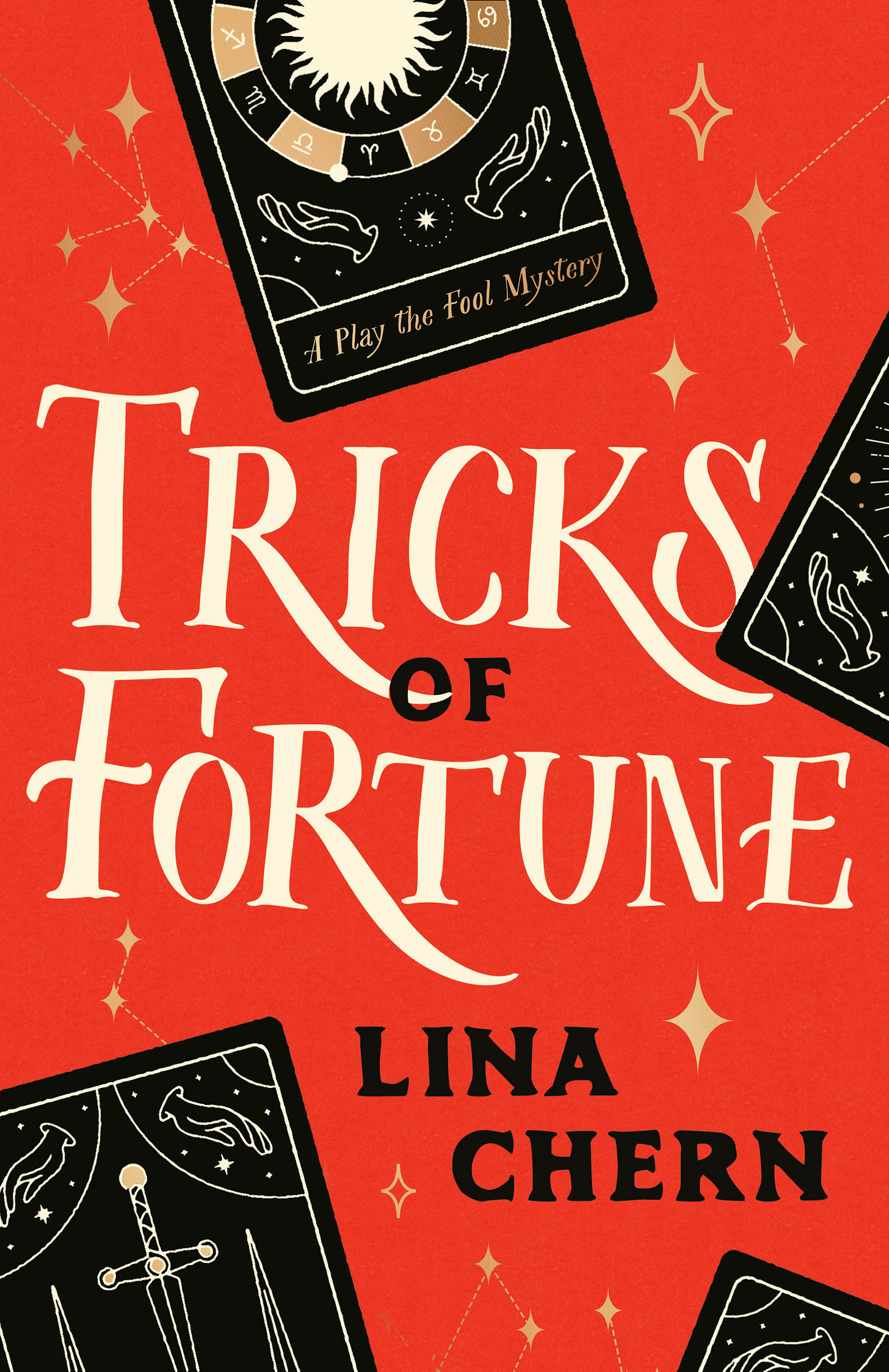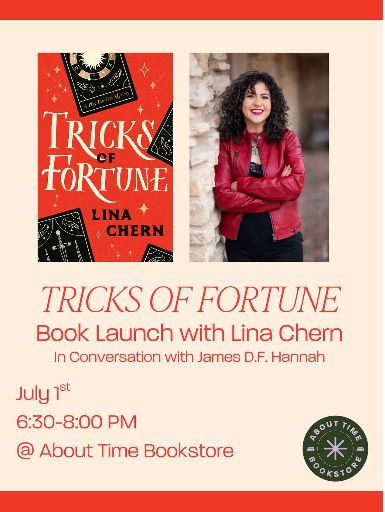#39: Five for Them, One for Me, with Lina Chern
Lina’s latest, TRICKS OF FORTUNE, is out today.
Lina Chern’s debut novel PLAY THE FOOL, featuring tarot reader Katie True, won the 2024 Mary Higgins Clark Award, and was nominated for both the Lefty and the Anthony. She’s following up the success of that book with the darker, twistier TRICKS OF FORTUNE, which brings Katie back, this time trying to find a police officer’s murderer.
Lina’s background ranges from writing trivia questions and word puzzles for a game show to video game voice work. Her work mixes sharply sarcastic humor with equal measures humor and heartbreak, and her use of tarot not as some mystical problem solver but rather a model of storytelling helps keep her characters grounded and relatable. She is what they mean when they call someone “a writer to watch.”
She’s also our Five for Them, One for Me.
Let’s go.
FIVE FOR THEM
1. What was the origin point for your novel TRICKS OF FORTUNE?
TRICKS OF FORTUNE was inspired by a highly publicized police officer death in my community ten years ago. This officer was a celebrated thirty-year career cop, a youth leader, a family man, your basic pillar of the community—but when the investigation dug into his life to look for his killers, it turned out he wasn’t the hero everyone thought he was. The case ended up going in a completely bonkers direction no one could have anticipated, and what struck me most about it was the myth-making – how ready people were to create a particular story about this guy, how resistant that story was to change, and how ferociously it turned on its face when the facts became undeniable. My books have always been (for me, anyway) about the stories we tell about our lives, and this bizarre case seemed like the perfect vehicle to explore those ideas further—especially with respect to larger social myths about law enforcement.
2. Your first novel, PLAY THE FOOL, met with critical acclaim and won the Mary Higgins Clark Award in 2024, as well as being nominated for both the Lefty and the Anthony. Going into this book, what were some of the challenges of following up a book that had the previous book’s success.
By the time the award and nominations were announced, Tricks of Fortune was mostly finished, so I didn’t feel much of an effect on the writing, either positive or negative. I’m honestly nor sure if feeling “successful,” whatever that means, would have made it easier or harder. The awards were a nice confidence boost in the home stretch of what turned out to be kind of a difficult book to write, but I think those difficulties were probably second-book-pains. Writing the first book is all about learning a process, and writing the second appears to be about the terror of having forgotten that process and having to relearn it a lot faster and with people tapping their watches (does anyone wear watches anymore?) at you. On the other hand, I’ve heard more experienced writers say that terror never goes away, so I look forward to many more years of terror.
3. I love the voice of your protagonist, Katie True. She’s snarky and sarcastic, but also heartfelt in a way that breaks through her jaded façade. Some of that voice might feel familiar to those who know you. How much of yourself did you draw for the character of Katie?
Most of it. What am I supposed to do, make stuff up? With my imagination? I’m not sure I’ve mastered the skill of writing in someone else’s voice yet—it’s on the to-do list. In the meantime, yes, Katie’s voice is similar to mine, but unencumbered by annoying things like social graces, fear, logic, reason, impulse control, and emotional defenses. She says and does stuff I wish I could do but don’t, for all the reasons that people, for better or worse, don’t say and do what they want to.
4. Most writers using tarot would put a lot of woo around it, making it mystical or supernatural. You treat it very matter-of-factly. Tell about how and why you chose the way you handle tarot.
I get asked this question a lot, and those who know me won’t be shocked that I have an actual Power Point deck explaining my answer. For the sake of your readers, I’ll whittle it down to an elevator pitch. The cards fascinate me not because they’re a magic portal for wisdom from Somewhere Else, but because they illustrate the human need to tell stories to make sense of a chaotic universe. The images on the cards represent universal human experiences—i.e. story elements—and because we’ve all heard and created the same stories, there are only so many places a tarot reading can go. Add to that a pinch of randomness and a shot of dynamic interpersonal uncertainty between reader and querent, and you get an experience that is at the same time familiar and unfamiliar, making it seem eerily, magically accurate. There’s no actual magic, unless you consider the human mind magical, which I kind of do.
5. You have a wonderful essay about meeting Harlan Ellison when you were a kid. He was a legendarily incendiary writer, so I’m wondering what influence he had on your development as a writer. How does meeting an idol like that affect you?
It affected me in some wonderful ways and some terrible ones! Ellison could very generously be described as a “complicated” person (read: jerk). Still, he went out of his way to support young fans, and I consider his very kind response to the fan letter I wrote him as a wee 13-year-old to be the start of my writerly aspirations. Unfortunately, I also absorbed from him a lot of harmful myths (those pesky myths again) about writing and creativity, some of which were probably self-inflicted. I spent way too much time comparing myself to him and other writers I admired – time I could have better spent working out my own process. Ellison was a particularly bad writer to compare oneself to, as he tended to do flashy things like toss off a short story in an hour with no revising, or proclaim that if you start a story in the wrong place and have to start over, you’ve already failed. Madness! It took me a long time to understand that trial and error and revision are the heart and soul of writing, not a mistake.
ONE FOR ME
Stepping away from tarot and to a different set of cards:
You’re playing a hand of blackjack against the dealer:
· Your hand: 8♠, 9♦ (Total: 17)
· Dealer's hand: Face-up card: 6♣
The Dealer has to stand on 17 or higher, and hits on 16 or lower.
Do you choose to hit, stand, double down, or split?
Here’s where they revoke my crime fiction writer’s membership card, because I only know what about half of the above terms mean. I know there’s math involved. Is there a fifth option: bore the dealer with a discussion of the historical evolution of the suit symbols, leave my watery, half-finished vodka tonic that I didn’t want anyway on the table and go home to fall asleep watching a quantum physics documentary? I’ll take that one.
TONIGHT! TONIGHT! TONIGHT!
Don’t forget that the launch event for TRICKS OF FORTUNE tonight at About Time Bookstore in Libertyville, Illinois, where I’ll be in conversation with Lina about the book. A great book, drinks, snacks, a tarot reader—I’ve heard there’ll be cake—so honestly, it’ll be as good a time as you could want on a Tuesday night.
That’s all we’ve got for now. Thanks for coming. See you next time, and hey, let’s be careful out there.





Nice interview, loved the Harlan Ellison essay as well!
I definitely consider the human mind magical ... cool interview!